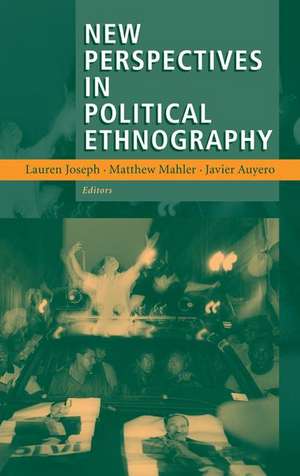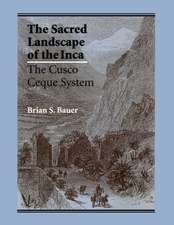New Perspectives in Political Ethnography
Editat de Lauren Joseph, Matthew Mahler, Javier Auyeroen Limba Engleză Hardback – 27 sep 2007
Politics, political institutions, and those working in politics (state officials, politicians and activists) have so far missed the lens of the ethnographer. As a group, politicians and those in politics can be found in every corner of the world. While political systems and politicians are by no means the same in every country, what brings these people together to be part of the political process?
Ethnography is uniquely equipped to look microscopically at the foundations of political institutions and their attendant sent of practices, just as it is ideally suited to explain why political actors behave the way they do and to identify the causes, processes and outcomes that are part and parcel of political life. The volume, based on a special issue of Qualitative Sociology has a two-fold purpose: to bring politics into the ethnographic literature and of ethnography in studies of politics. The case studies included are based on the research of ethnographers studying the various level of politics in Brazil, Japan, El Salvador, Bosnia, the Philippines, India and the United States. It will be of interest to those in the sociology of politics, political science and those looking for ethnographic research on a global level.
Preț: 645.28 lei
Preț vechi: 759.15 lei
-15% Nou
Puncte Express: 968
Preț estimativ în valută:
123.47€ • 129.26$ • 102.17£
123.47€ • 129.26$ • 102.17£
Carte tipărită la comandă
Livrare economică 05-19 aprilie
Preluare comenzi: 021 569.72.76
Specificații
ISBN-13: 9780387725932
ISBN-10: 0387725938
Pagini: 258
Ilustrații: VIII, 258 p.
Dimensiuni: 155 x 235 x 16 mm
Greutate: 0.55 kg
Ediția:2007
Editura: Springer
Colecția Springer
Locul publicării:New York, NY, United States
ISBN-10: 0387725938
Pagini: 258
Ilustrații: VIII, 258 p.
Dimensiuni: 155 x 235 x 16 mm
Greutate: 0.55 kg
Ediția:2007
Editura: Springer
Colecția Springer
Locul publicării:New York, NY, United States
Public țintă
ResearchCuprins
From Confusion to Common Sense: Using Political Ethnography to Understand Social Mobilization in the Brazilian Northeast.- Losing Face in Philippine Labor Confrontations: How Shame May Inhibit Worker Activism.- Radical Outcasts Versus Three Kinds of Police: Constructing Limits in Japanese Anti-Emperor Protests.- Honor and Morality in Contemporary Rural India.- Routing Conflict: Organized Violence and Clientelism in Rio de Janeiro.- Vicious Virtuous Circles: Barriers to Institution-Building after War.- Are National Politics Local? Social Movement Responses to the 2004 US Presidential Election.- Professional Performances on a Well-Constructed Stage: The Case of an Institutionalized Advocacy Organization.- Field Research During War: Ethical Dilemmas.- Politics as a Vocation: Notes Toward a Sensualist Understanding of Political Engagement.- Afterword: Political Ethnography as Art and Science.
Recenzii
From the reviews:
“Provides thick examples of ethnography in action and conveys the unique value of ethnography as an effective research tool for exploring political phenomena. … appeal to practicing social scientists … . inspire students to pursue their passion to study politics … both real and imagined – to master the quantitative methodologies that characterize political science today. … collections will be worthwhile reading for scholars and graduate students, and essential reading for an undergraduate intent on a career in political science.” (Jeffrey D. Hilmer, Acta Politica, Vol. 46 (1), 2011)
“Provides thick examples of ethnography in action and conveys the unique value of ethnography as an effective research tool for exploring political phenomena. … appeal to practicing social scientists … . inspire students to pursue their passion to study politics … both real and imagined – to master the quantitative methodologies that characterize political science today. … collections will be worthwhile reading for scholars and graduate students, and essential reading for an undergraduate intent on a career in political science.” (Jeffrey D. Hilmer, Acta Politica, Vol. 46 (1), 2011)
Textul de pe ultima copertă
The use of ethnographic research - social research based on the observation of individuals or institutions where the researcher becomes part of the group or very close to the group to better understand their actions - is becoming more and more of a prevalent methodology within sociology. As ethnography gains prominence within the discipline its focus, theoretical underpinnings and narrative styles are also expanding to the yet-unexamined worlds and institutions of society.
Politics, political institutions, and those working in politics (state officials, politicians and activists) have so far missed the lens of the ethnographer. As a group, politicians and those in politics can be found in every corner of the world. While political systems and politicians are by no means the same in every country, what brings these people together to be part of the political process?
Ethnography is uniquely equipped to look microscopically at the foundations of political institutions and their attendant set of practices, just as it is ideally suited to explain why political actors behave the way they do and to identify the causes, processes and outcomes that are part and parcel of political life. The volume, based on a special issue of Qualitative Sociology has a two-fold purpose: to bring politics into the ethnographic literature and of ethnography in studies of politics. The case studies included are based on the research of ethnographers studying the various level of politics in Brazil, Japan, El Salvador, Bosnia, the Philippines, India and the United States. It will be of interest to those in the sociology of politics, political science and those looking for ethnographic research on a global level.
Politics, political institutions, and those working in politics (state officials, politicians and activists) have so far missed the lens of the ethnographer. As a group, politicians and those in politics can be found in every corner of the world. While political systems and politicians are by no means the same in every country, what brings these people together to be part of the political process?
Ethnography is uniquely equipped to look microscopically at the foundations of political institutions and their attendant set of practices, just as it is ideally suited to explain why political actors behave the way they do and to identify the causes, processes and outcomes that are part and parcel of political life. The volume, based on a special issue of Qualitative Sociology has a two-fold purpose: to bring politics into the ethnographic literature and of ethnography in studies of politics. The case studies included are based on the research of ethnographers studying the various level of politics in Brazil, Japan, El Salvador, Bosnia, the Philippines, India and the United States. It will be of interest to those in the sociology of politics, political science and those looking for ethnographic research on a global level.
Caracteristici
The first ethnographic study of politicians and political systems Global case studies focusing on various groups within the local political systems Part of the growing trend in expanding ethnographic research into new worlds of interest














